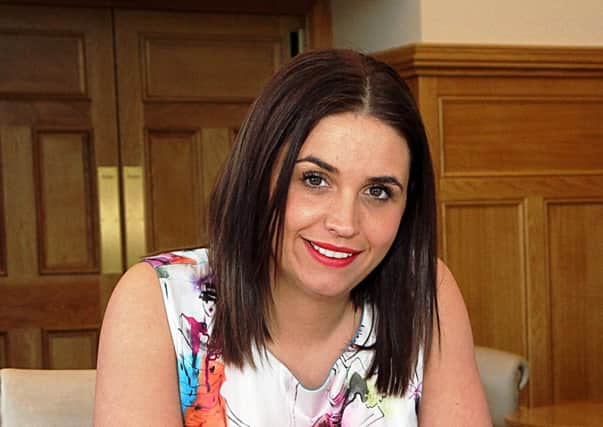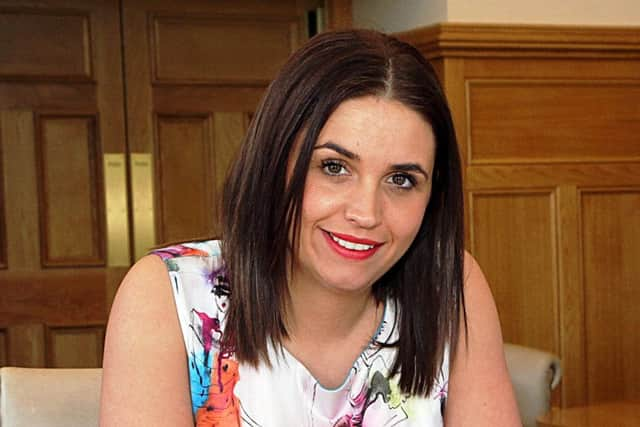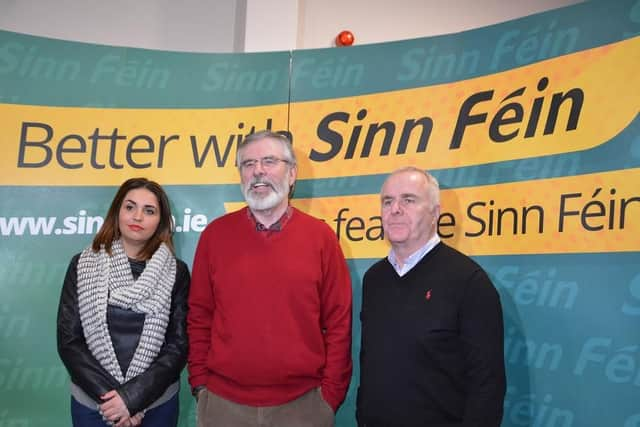Video: Former hunger strike Raymond McCartney and SDLP leader Colum Eastwood react to a potentially game-changing result in Foyle and across the North


SDLP leader Colum Eastwood, on the other hand, is happy the party consolidated its position in Derry and elsewhere, which it has done. Mr. Eastwood admits Sinn Féin's gains have overshadowed his own, but he has put on votes and retained seats from a position he described as the "squeezed middle", in a context he described as a polarised and "very dangerous political time".
Reacting to an incredible result, which saw Elisha McCallion top the poll in Foyle with more first preferences than any Sinn Féin candidate in the North bar Michelle O'Neill (Mid Ulster) and Sinéad Ennis (South Down), Mr. McCartney said: "Going into the election we were confident of taking the two seats but certainly this was the largest vote we've ever had in the Foyle constituency in every election we've ever fought.
Advertisement
Hide AdAdvertisement
Hide Ad"It's down to, largely, that we had the right message. I think people understood well why Martin McGuinness collapsed the Assembly.


"We had an excellent team who worked night and day. Larger numbers, people turning out, people coming in to assist us, on the day we got our vote out.
"We reaped the rewards of our political message, our political stability, our political credibility and then obviously we had a good team of people around us."
But something else happened on Thursday. People came out for Sinn Féin, and in general, but especially for nationalist parties, in droves not seen since the turn of the century. The turnout in Foyle was 65 per cent!
Advertisement
Hide AdAdvertisement
Hide AdThere had been speculation about where estranged gene-pool Sinn Féiner, Anne McCloskey's, 3,000 plus votes - she ran in May 2016 but not his year - would go, but it seems Sinn Féin benefited, not only from these formerly dissenting voters, but from dormant supporters too.


"There were people who hadn't voted for a long number of years, for maybe a couple of elections for a variety of reasons, but certainly this election, they knew the need to vote and they came out to vote," said Mr. McCartney.
"There will be speculation because Anne McCloskey's vote didn't transfer but Kathleen's [Bradley] did and it was an even enough split. So you can look across the parties that would have benefited but there's no doubt there was an extra number of people because as far back as Mitchel McLaughlin - Mitchel got around 15,000 [2005: Westminster] and it was even higher than that. [Mitchel got 32.7%; McCallion/McCartney: 37%]"
He added: "So there were people, young voters, people, for want of better words, who had maybe switched off - I hate using that terminology - but there was a re-engagement and we reengaged with people and they got what this election was about."
Advertisement
Hide AdAdvertisement
Hide AdHe said solidarity with Martin McGuinness who has had step aside from front line politics due to ill health was one reason Sinn Féin's vote increased so spectacularly.


"I think people saw what Martin did. I think, the fervour, even with his failing health, but the simplicity of his message. It was about dignity and respect. Implementing agreements already made and bringing equality to the heart of government and then, obviously, dealing with incompetence and alleged corruption."
Remarkably, the strong performance by Sinn Féin and the SDLP in Foyle has helped return 40 MLAs, if West Belfast People Before Profit MLA Gerry Carroll is included, who would be inclined, to lesser and greater extents, towards a United Ireland.
If Stormont gets back on its feet these MLAs will face off against a 40 strong unionist bloc of MLAs (DUP, UUP, TUV and Claire Sugden) with all eyes on the Alliance Party, the Greens, and James Brokenshire, who will face increasing demands for a border poll, given Brexit and the numbers above.
Advertisement
Hide AdAdvertisement
Hide AdDespite all this, Mr. McCartney believes a stable Executive is possible if Sinn Féin's concerns are heard.


"There's no reason why the Executive can't be reformed but what we are saying very, very clearly: we must implement, previously made agreements.
"There's no point saying we have a stated aim that we're out to create a fairer and more equitable society, then you say to some citizens: but that doesn't include you.
"So that was the message at the door. People understood and understand well, particularly places like Derry, understand what equality is and what it should mean.
Advertisement
Hide AdAdvertisement
Hide Ad"The DUP need to understand what equality means, it means equality."
While Sinn Féin are up to 16,350 (37 per cent) from 11,279 (28.5 per cent) last year - their best performance ever in the constituency -the SDLP also performed extremely well.
Party leader Colum Eastwood came in second on first preferences with 7,240 (16 per cent), with Mark H. Durkan fourth with 6,948 (16 per cent). The SDLP's combined share in Foyle is now up to 14,188 (32 per cent) from 11,897 (30 per cent) last year.
"We're very happy. We set out to maintain and to retain two seats and we did that," said Mr. Eastwood. "We also increased our vote by nearly two and a half thousand votes. Of course, Sinn Féin have had a fantastic election across the North and that's affected us here in Derry as well."
Advertisement
Hide AdAdvertisement
Hide AdHe added: "That's just the political context that we are living in. It's a very polarised context and a very dangerous political time for everybody. Sinn Féin have maximised that opportunity.
"We've held strong. We've held our vote share across the North. Our votes across the North are up by about 12,000 and I think we are in and around, proportionally, what we had in he last Assembly as well in terms of seats."
Mr. Eastwood said he wasn't surprised by the huge increase in turnout.
"We were very clear this was going to be a huge turnout. People were coming out, who hadn't been out in a long time, and, of course, that benefited us, but it also benefited Sinn Féin. Even to a greater degree because people wanted to get angry and they wanted to get even with Arlene Foster.
Advertisement
Hide AdAdvertisement
Hide Ad"That's what they were trying to do. And, of course, the whole election was pitched as a battle between Sinn Féin and the DUP and people, many people, punted for Sinn Féin, to send that message. It's quite clear we were in a very difficult place
"We were the squeezed middle, we managed to up our vote, here and across the North, and I think that's a big achievement."
Asked what he though drove people to the polling stations, Mr. Eastwood said: "It was down to RHI, Brexit, and every other scandal that we've had over the last number of years. It's about time now that we get back to the job of governing this place and get back to the job of trying to make the peace process work because if we just acceet that we're not going to have a government here then we're in serous trouble. I don't think any of us should be prepared to accept direct rule from London."
First Count
Elisha McCallion's stunning performance headlined the best ever election result for Sinn Féin in Derry. The former Mayor, who was named on the Sinn Féin ticket after Martin McGuinness stood down from front-line politics due to ill health in January, was elected on the first count on Friday having smashed the 7,437 quota with her 9,205 (20.7 per cent) of all valid ballot papers.
Advertisement
Hide AdAdvertisement
Hide AdHer transfers elected running mate Raymond McCartney after Stage Two. He came in third in Foyle with 7,145 (16 per cent) of the poll.
Sinn Féin celebrated a massive increase in their tally from the Assembly Election in 2016.
They are now up to 16,350 (37 per cent) from 11,279 (28.5 per cent): their best performance ever in the constituency.
It was also a good election for the SDLP. Party leader Colum Eastwood came in second with 7,240 (16 per cent), with Mark H. Durkan fourth with 6,948 (16 per cent).
Advertisement
Hide AdAdvertisement
Hide AdThe SDLP's combined share in Foyle is now up to 14,188 (32 per cent) from 11,897 (30 per cent) last year.
Significantly, Eamonn McCann of People Before Profit held his own, increasing his personal share from 4,176 (10.5 per cent) in May 2016 to 4,760 (10.7 per cent) in March 2016, but that was not enough to see him returned again, with the Sinn Féin, the SDLP and Gary Middleton of the DUP, the major beneficiaries from inter-bloc transfers.
Gary Middleton, of the DUP, increased his share of the vote from 4,737 (11.9 per cent) to 5,975 (13 per cent) and Julia Kee, of the UUP, was marginally up from 1,420 (3.6 per cent) last May to 1,660 (3.7 per cent) today.
The total unionist vote in Foyle was actually down in percentage terms from 7,330 (18.4 per cent) to 7,635 (17 per cent) today. That was just over the quota of 7,437 (16.7 per cent), which meant Mr. Middleton wouldn't reach it given the tradition of UUP voters transferring to the SDLP.
Tale of the tape
Stage Six
Advertisement
Hide AdAdvertisement
Hide AdStage Six Eamonn McCann has lost his seat in Foyle after Stage Six of the count, with five candidates now returned. Following the distribution of Mark H. Durkan's 976 surplus votes, Mr. Middleton, who received 134 from the SDLP man, finished on 7036.37.
Mr. McCann received 451 and ended with 6373.16.
All seats have now been filled with Elisha McCallion and Raymond McCartney (Sinn Féin), Colum Eastwood and Mark H. Durkan (SDLP) and Gary Middleton (DUP), Foyle's new MLAs.
Stage Five
Mark H. Durkan has exceeded the quota by 976 and been formally declared the fourth candidate elected in Foyle. The SDLP candidate finished on 8,414, with the DUP's Gary Middleton on 6,902 and Eamonn McCann of People Before Profit's Eamonn McCann on 5,922.
Mr. Durkan's surplus will now be distributed and although Eamonn McCann cannot surpass Mr. Middleton even if he receives all of it, People Before Profit appear to be insisting that a final breakdown is delivered, their reasoning possibly, that a close margin enough margin would justify a recount.
Stage Four
Advertisement
Hide AdAdvertisement
Hide AdNo-one elected after the redistribution of transfers from Green, Shannon Downey (264), CISTA, John Lindsay (225), Tory, Stuart Canning (79) and Independent, Arthur McGuinness (56). Mark. H. Durkan edged closer to the quota though: on 7,380 after Stage Four. Gary Middleton on 6008 and Eamonn McCann on 5292.
The exclusion of Julia Kee of the UUP (1,704) and Colm Cavanagh of Alliance (1,295) will likely put Mark. H. Durkan and Gary Middleton out of Eamonn McCann's reach.
Stage Three
Following the election of SDLP leader Colum Eastwood after Stage Three, the lowest polling candidates, Green, Shannon Downey (264), CISTA, John Lindsay (225), Tory, Stuart Canning (79) and Independent, Arthur McGuinness (56), were excluded.
The redistribution of their 624 votes were expected to effectively put Mark. H. Durkan, out of reach of the People Before Profit candidate Eamonn McCann, who was on 5,087 votes after Stage Three. Mr. Durkan was on 7,276 votes after Stage Three. The quota is 7,437. DUP candidate Gary Middleton, on 5977 after Stage Three, will ultimately be the main beneficiary of UUP candidate Julia Kee's transfers. Ms. Kee was on 1669 after Stage Three.
East Derry
Advertisement
Hide AdAdvertisement
Hide AdSinn Féin's Cathal Ó hOisín's transfer deficit was his downfall again in 2017, exactly the same as last May. The Dungiven republican polled extremely well on first preferences but couldn't compete with the SDLP in attracting unionist transfers. Unionists in East Derry once again used STV to vote against the return of two Sinn Féin MLAs.
Stage Twelve
Sinn Féin's poll-topping Caoimhe Archibald was declared elected along with the SDLP's John Dallat following the distribution of Claire Sugden's surplus at the end of the final stage of counting. Ms. Archibald finished on 6,330 with Mr. Dallat on 6,091.
Mr. Ó hOisín lost out, trailing behind with 5,238. All five seats in East Derry are now filled.
Stage Eleven
George Robinson's surplus was distributed. John Dallat got 266 of these and his tally rose to 5,709.
Cathal Ó hOisín received 15 and lagged behind at 5,236.
Stage Ten
Advertisement
Hide AdAdvertisement
Hide AdFollowing the distribution of Maurice Bradley's surplus, John Dallat crept further ahead of Cathal Ó hOisín, increasing his tally to 5,433 to the Dungiven man's 5,221.
Stage Nine
After Stage Nine when George Robinson and Maurice Bradley, both of the DUP, were deemed elected with 8,056 votes and 7,801 votes respectively, John Dallat had sneaked past Mr. Ó hOisín. Mr. Dallat is up to 5,298, ahead of Mr. Ó hOisín, who trails on 5,211.
With Mr. Bradleys' surplus now been redistributed it is not looking good for the Dungiven republican.
Stage Eight
Following the distribution of UUP candidate, William McCandless' surplus - he and his 3,581 votes were excluded after Stage Seven - outgoing Justice Minister Claire Sugden exceeded the 6,979 quota by over 576 votes finishing on ,7,555 and was first elected in the constituency.
Advertisement
Hide AdAdvertisement
Hide AdDUP incumbent Adrian McQuillan has also become one of the main victims of the six to five seat reduction in the constituency and was eliminated after Stage Eight. His 4,566 votes will now be distributed, following which his running mate Maurice Bradley, on 6,739, will be elected.
George Robinson, on 5,335 after Stage Eight, will also be safe even if he does not reach the quota following the distribution of Mr. McQuillan's transfers. Caoime Archibald is unassailable on 6,311 but her running mate Cathal Ó hOisín looks vulnerable to SDLP comeback candidate John Dallat, who picked up 777 of Mr. McCandless' transfers.
Mr. Dallat is on 5,143 after Stage Eight. Mr. Ó hOisín is on 5,202, just 59 ahead. Mr. Ó hOisín received just six transfers from Mr. McCandless - contrast Mr. Dallat's 777 - and is unlikely to receive much more, if any, from McQuillan. It will be a tense shoot out between the lower polling nationalists in East Derry for the last seat.
Stage Seven
After Stage Seven in East Derry, the outgoing Justice Minister Claire Sugden, was leading the pack on 6,561 votes: just 418 short of the quota of 6,979 and well poised to be the first seat filler in the constituency following the distribution of UUP candidate William McCandless' surplus.
Advertisement
Hide AdAdvertisement
Hide AdPoll-topper Sinn Féin's Caoimhe Archibald was on 6,299 but was unlikely to attract many transfers from Mr. McCandless. Coleraine DUP man, Maurice Bradley was, however. And he was sitting on 6,171 after Stage Seven.
He was followed by Sinn Féin's Cathal Ó hOisín who had 5,196. Interestingly, Mr. Ó hOisín has attracted far more transfers this year than last. He got 175 from Independent Gerry Mullan after Stage Six and 41 from the Alliance party's Chris McCaw after Stage Seven. He only received 40 transfers in total across the whole count last May.
The DUP's triangulation vote management, which saw Maurice Bradley, George Robinson and Adrian McQuillan hoover up loyal voters in their heartlands of Coleraine, Limavady and Garvagh respectively last year, may not be enough to return all three this time. After Stage Seven, Mr. Robinson was on 4,993 and Mr. McQuillan was on 4,170, well short of the quota and split by SDLP candidate John Dallat who was on 4,366.